 What other tunings do you use?
What other tunings do you use?
Vance Gilbert is obviously distracted by the strikingly handsome guy sitting near the stage taking notes. Ellis Paul announces that there's a reporter in the house. "A reporter?" Vance teases.
"A crime reporter," I respond.
In a sense, my quip is true. Get these two old buddies on stage and they become partners in crime. Before the evening is through, Common Ground will witness: what everyone hopes is Vance's last interpretive dance; a battle of the Fab Four songbook as each performer ups the ante with increasingly weirder cuttings from songs as diverse as "I am the Walrus" and "Only Sixteen"; and the appearance on stage of Louise, Gilbert's poodle, inspiring Ellis to remark, "Now we're Three Dog Night."
There is a method behind all of this...
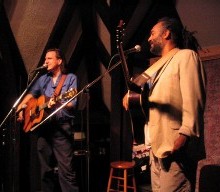 I've seen each of you described as a folk superstar. Is that an oxymoron?
I've seen each of you described as a folk superstar. Is that an oxymoron?
E: To describe Vance as a folk singer is the oxymoron.
V: I am a folksinger.
E: But you're more than a folksinger.
V: I can be whatever it takes to be a folksinger. Folk music to me, if we had to have a definition, is portable music. A lot of what I do is flash, gesture, athletics, but what it comes down to is getting across a melody that will help it stick to your ribs, and being able to take it from town to town.
The folk scene is completely under the radar. And yet, from another vantage point, it's huge: a few places doing good business in every big town, many smaller venues, the open mics, the house concerts, all the people who call themselves singer-songwriters.
V: (Laughs) You just used the words huge and house concert in the same sentence.
There's something to that. I tell people I'm big in the music business like a barnacle is big in shipping. But, take Christian pop music... Outside of Amy Grant, how many people can you name? Yet it's probably tied with country music as the money scene. It's huge.
The music pot is broad. It's just unfortunate that the record companies cry the blues as frequently as they do. They can kiss my ass.
E: It's a self-sufficient sub-culture. We put out records ourselves, book ourselves, manage ourselves.
The term folk music... no one knows what it means. They picture Woody Guthrie, and Peter, Paul, and Mary and that's where their vision stops. Our job is to get out there and show people what we're doing. It's folk music, but it's not 1960. It's a different century and we're not doing working songs...
V: That's what I like about what Ellis does. In a lot of ways you are doing working songs. But with such a great musicality and such a worldly view and it's still folk music. It puts the face on it that it needs.
Part of our job is to be as entertaining as possible - I'm gonna go out on a limb here - less in line with Peter, Paul, and Mary, more in line with the Smothers Brothers. Those guys were friggin' entertaining. They played. They sang. They made you laugh. Next thing you knew, you were totally entertained. And black people were home watching the Smothers Brothers. And black people weren't listening to a whole lot of Peter, Paul, and Mary.
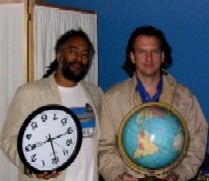 Ellis and Vance like and admire each other. We like and admire them all the more for it.
Ellis and Vance like and admire each other. We like and admire them all the more for it.Do you remember the first time you met?
V: In the foyer of an ad hoc coffeehouse, the Naked City. I was so taken with this guy who had such original poetry. And I didn't have that. I was doing some covers and some of my stuff that was more groove oriented. I thought of the lyric more as a modus operandi for carrying that groove. Here's a guy who was doing that but was also killing me with poetry...
They became roommates. "I cooked. He cleaned. We never had sex," Gilbert remarks. "Sounds like a marriage to me."
Their camaraderie brings more than a manic spontaneity and infectious sense of celebration to the evening. Their collaboration creates a heightened musicality. When someone requests Paul's "Maria's Beautiful Mess," they trade discoveries on stage. Vance opens with a beautiful guitar figure. Afterwards, Ellis whispers that he didn't realize Vance knew the song. Vance
replies that he hadn't heard it in two years!
Ellis, your guitar was plugged in and miked. Vance was only plugged in.
E: I mike the Guild because it's a high-strung guitar. It gives a little more body to the tone. I don't really need it for the other guitar, but it's up there so I use it. I'm just trying to get a warm woody sound out of the pick-up and the mike helps.
V: We both lean pretty heavily on the plugged in part.
Vance, you were in standard tuning. Ellis uses a few different tunings. "The Only Way..."
E: That's open D... DADF#AD
On the record, "This Morning I am Born Again" sounds like a drop D...
E: Double drop D.
 What other tunings do you use?
What other tunings do you use?
E: I use a Joni Mitchell tuning that's like an open G with the bass down to C... CGDGDE.
Why do you like the open tunings?
E: It gives an orchestral effect. It's easier to pull bass notes out so you have a fuller band behind you. I also do a lot of things with octaves. It gives more depth to my playing.
V: I go in for a simpler sound rather than the open tune, an acoustic guitar slinging kind of guy. In "Why Are We So Cruel," I'm playing a lot of open notes trying to get the strings to ring. I like to back myself into a corner in standard tuning while - as David Wilcox says - still letting the guitar do the work.
I read that you "couldn't be more different in (your) musical influences." Is that true?
V: You know...
E: ...we could be a lot more different.
V: We could be more different. But we're different. There are places where the listening we did brings us together. We're both great fans of James Taylor and Joni Mitchell...
E: That's where we really cross.
V: It goes without saying.
Ellis how did you get turned on to that kind of music listening to AM in small town Maine?
E: It was classic hits radio in the 80's. Neil Young, Bob Dylan, Joni Mitchell and a lot of James Taylor.
 From inner city Philadelphia, where did you get turned on to this music?
From inner city Philadelphia, where did you get turned on to this music?
V: In college. That's when I first picked up the guitar and everyone was playing James Taylor, Aztec Two Step, Jackson Browne...
Seminally, when I was living in Philly, I was listening to R+B and pop. My parents were listening to Dakota Staton, Dinah Washington, and Ray Charles... the jazz pop of that era.
Who brought which tunes to the recording?
E: The ones I sing lead on I brought...
Like John and Paul...
E: (in Liverpudlian) Right.
V: The only one where there is a co-lead is "Comfort You." He came in and saved me when we weren't bringing anything new to it. His lead could stand by itself, and that's what we wanted. It made the song work.
Your originals tend to be character studies, some semi-autobiographical. This album is almost totally made up of anthems, affirmations. September 11th was hanging over the whole project...
E: We wanted it to be a post 9/11 record that wasn't so much about 9/11, but about where we are now. What are we going to do? Where do we stand? A comforting kind of record.
The set includes the title track, Lucinda William's "Side of the Road," more energetic than on the record, with a syncopated attack on the guitar from Vance, who adds some bass runs.
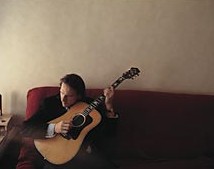 One of you is quoted as saying, "Some of these tunes are so out of the realm of what we do." Which ones?
One of you is quoted as saying, "Some of these tunes are so out of the realm of what we do." Which ones?
E: "Comfort You." A duo, a shared thing...
V: "Side of the Road" is different from what I would do.
E: And me.
V: Each time I sing it, I approach it guilelessly. I have a penchant for putting my arms around something and crushing it until it suffocates musically. That's something I'm learning not to do. Sometimes you have to get out of the way of a great song. Singing this song is like holding a bee in your hand. You have to hold it gently.
In a way, it's hard to see how it fits thematically on the CD. In another way, it announces that this is more than about where our society is; it's a journey of self-discovery...
E: Bingo...
V: Bingo...
E: Thank you. That's exactly why it's there...
V: And that was your job of self-discovery right there. We've gone everywhere from side of the road introspection to the buddy-buddy sensibility of "Comfort You."
E: And then "Citizen of the World" which is global.
You do some songs from artists whose music - to my mind - makes a point of being rough: Lucinda Williams, Neil Young, and Van Morrison.
 V: Not always. I'm not going to let you get by with a blanket classification like that, but I see where you're going.
V: Not always. I'm not going to let you get by with a blanket classification like that, but I see where you're going.
You take the songs and make them impossibly pretty.
E: I wasn't trying to make anything pretty. I come pretty, man.
Mark Erelli's inspirational, "The Only Way" follows, a post 9/11 affirmation and the opening cut on the CD.
"The Only Way"... As soon as I heard the first fiddle notes, I felt comfortable. It's Massachusetts back porch music.
E: We were going for a comfortable feel because it's a message song and you don't want to drive it down people's throats.
I love the line, "Too young to be cynical, too old to be naïve." Has that been said before?
V: Who cares? When I teach songwriting I call that a re-used cliché. If you can use it and make it work for you, then it's no longer a cliché.
Gilbert's insightful "Why are We So Cruel?" portrays a character's awareness of how anger passes from one generation to the next. Rapid strumming leads to a frenetic solo up the neck and appreciative applause.
Paul's understated "Conversation with a Ghost" changes the pace and features a lovely finger-picking duet.
Vance follows with "Unfamiliar Moon" in which the speaker returns to his house after a break-up to find the "stars out of place. Everything is new."
Ellis brings out his Guild -- inscribed "Anti-Terrrorist Machine," a homage to Woody Guthrie's "This Machine Kills Fascists" -- for the title track of "The Speed of Trees". The tune morphs into Vance's improvised Rasta rap. Ellis asks if Gilbert is doing a rabbi or a Jamaican. Without blinking, Vance rhymes, "I don't eat shrimp, pork, or bacon. That makes me a Jew-maican."
A brief tribute to Dave Carter, then some simple Cotton-picking segues into a syncopated opening for "Gentle Arms of Eden." A sweet a capella duet and a reprise of the chorus with guitar ends the tune.
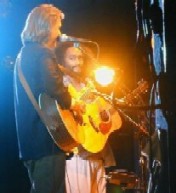 "Gentle Arms of Eden"
"Gentle Arms of Eden"
V: Someone called ours a controversial version. I get everything from: "It's slow. It's different. Dave would never have done it like that." Tracy Grammar says she likes this version because she can finally hear the lyrics. That's good enough for me.
E: It's a very visual version of the song. It unfolds like a Disney cartoon with things coming out of the ether and developing into a planet, like Fantasia.
V: Exactly.
Gilbert's "Unforgivable," sounds like an old jazz standard. A mouth trumpet solo delights the audience.
What were those chords?
V: It's in C. To give it that feel... (Scats the melody.) Playing the major 7th against the third makes it jazzy. The chords are not unlike "A Change is Gonna Come." I'm into that era, a post-jazz standard, pre-sixties thing...
E: (deepening his voice) 1964...
V: Exactly.
I was surprised you didn't mention Sam Cooke as an influence.
V: Of course (he was an influence). "Unfamiliar Moon" is right out of that feel, too.
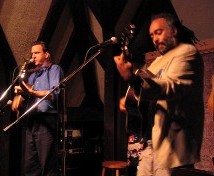 Paul and Gilbert end the set out in the audience with a rousing "Citizen of the World," their only co-write.
Paul and Gilbert end the set out in the audience with a rousing "Citizen of the World," their only co-write.
The audience demands an encore and the show closes with Gilbert's "Alone Down Here" and a well deserved standing ovation.
How about the recording process? What was that like with the two of you?
E: Fun.
V: We're very comfortable with each other so it was a good place to fail, which you're bound to do in the recording process. Each of us knows what he's not capable of…
I just saw you perform and I don't know what you're not capable of...
(Laughter)
© 2003
David Kleiner
(photos # 1 and 8 © Edan Schiller)
Here's a discography for Ellis Paul:
Here's a discography for Vance Gilbert:
For more information, see Ellis Paul’s website at www.ellispaul.com and Vance Gilbert’s website at www.vancegilbert.com..